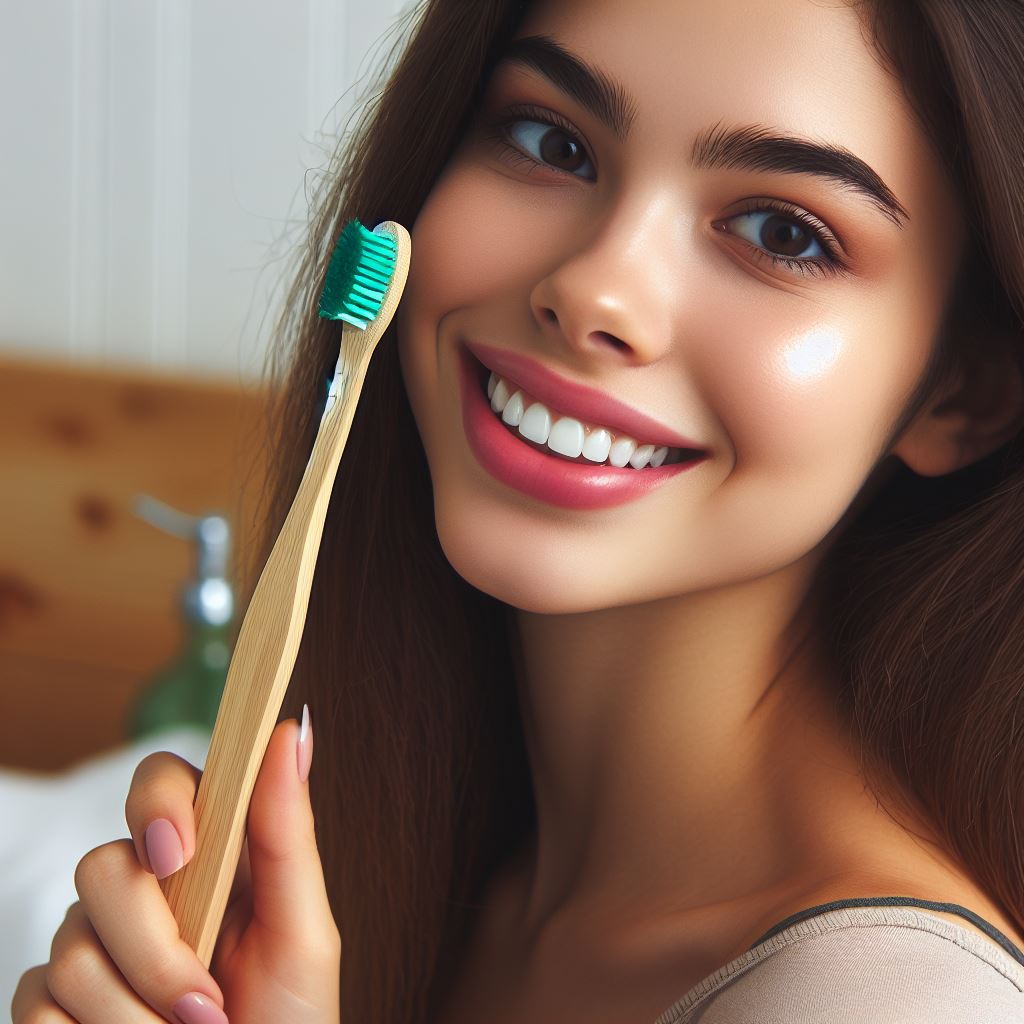The Importance of Dental Health
Replace Your Bamboo Toothbrush is maintaining good oral hygiene is crucial for overall health. Regular brushing helps prevent tooth decay, gum disease, and bad breath. Traditional plastic toothbrushes have been widely used, but their environmental impact is a growing concern.
Dental health is more than just having a set of pearly whites. It involves maintaining healthy teeth and gums, which contribute to our ability to eat, speak, and smile confidently. Proper oral hygiene practices, like brushing, flossing, and regular dental check-ups, play a vital role in maintaining dental health.
Here are some key points about the link between oral health and overall health:
- Oral Health and Overall Health Connection:
- Your oral health offers clues about your overall health.
- Problems in the mouth can affect the rest of the body.
- Germs in the mouth can lead to disease throughout the body.
- Good oral care (daily brushing, flossing) keeps germs under control.
- Certain diseases (e.g., diabetes, HIV/AIDS) can worsen oral health problems.
- Conditions Linked to Oral Health:
- Endocarditis: Infection of the inner lining of the heart chambers or valves.
- Cardiovascular Disease: Heart disease, clogged arteries, and stroke might be linked to oral germs.
- Pregnancy and Birth Complications: Gum disease (periodontitis) linked to premature birth and low birth weight.
- Pneumonia: Oral germs can go into the lungs and cause respiratory diseases.
Bamboo Toothbrushes: An Eco-Friendly Alternative
Enter bamboo toothbrushes! These sustainable alternatives offer several benefits:
- Renewable Material: Bamboo is a fast-growing plant that can be harvested without harming the environment.
- Biodegradable: Unlike plastic, bamboo toothbrushes break down naturally over time.
- Antibacterial Properties: Bamboo possesses natural antimicrobial properties, inhibiting bacterial growth on the bristles.
Lifespan of Bamboo Toothbrushes
So, how long do bamboo toothbrushes typically last? Here’s what you need to know:
- Recommended Lifespan: Bamboo toothbrushes generally last 3-4 months, similar to traditional plastic toothbrushes.
- Durability: They are comparable to plastic toothbrushes, but individual experiences may vary.
- Care Tips: To extend their lifespan, rinse thoroughly after use, store upright in a dry area, and avoid excessive moisture.
Understanding Bamboo Toothbrushes
What is a Bamboo Toothbrush?
- A bamboo toothbrush is a manual toothbrush similar in design to conventional plastic toothbrushes, but with a key difference: its handle is made from sustainable bamboo instead of plastic.
- The bristles, typically made of nylon, are attached to this bamboo handle to remove food debris and plaque from your teeth and gums.
Benefits of Using a Bamboo Toothbrush:
- Environmental Sustainability:
- Bamboo is a fast-growing and renewable resource. Unlike plastic, which takes centuries to decompose, bamboo is biodegradable and breaks down naturally over time.
- Its rapid growth rate and minimal resource requirements make it an excellent choice for reducing our ecological footprint.
- Reduction of Plastic Waste:
- Plastic toothbrushes contribute significantly to plastic waste. By switching to bamboo toothbrushes, we can reduce our contribution to plastic pollution.
- The biodegradable bamboo handle, along with proper disposal of the bristles, offers a sustainable solution that helps protect our planet’s ecosystems and reduces the burden on landfills and oceans.
- Low Environmental Impact:
- Bamboo cultivation has a relatively low environmental impact. It’s naturally resistant to pests and diseases, minimizing the need for chemical pesticides and fertilizers.
- Its extensive root system helps prevent soil erosion and promotes healthy land regeneration.
- Health and Safety:
- Bamboo toothbrushes are safe for daily oral care. The smooth, splinter-free bamboo handle provides a comfortable grip.
- The bristles, typically made of nylon, are considered safe for oral use. Individuals with specific allergies can explore alternative bristle options made from plant-based materials.
- Conscious Consumerism:
- Opting for a bamboo toothbrush aligns with sustainable living practices. By actively choosing eco-friendly products, we contribute to reducing plastic waste and promoting a greener future.
- Bamboo toothbrushes serve as a reminder of our power as consumers to make positive changes for the environment.
Optimal Dental Health Practices
- Daily Dental Care Tips:
- Brush Your Teeth Twice a Day: Brushing at least twice a day is essential. Don’t forget to brush before bed to remove germs and plaque that accumulate throughout the day.
- Proper Brushing Technique: Use gentle, circular motions to remove plaque. Pay attention to the gum line and all tooth surfaces.
- Tongue Cleaning: Gently brush your tongue to prevent bad breath and maintain oral health.
- Use Fluoride Toothpaste: Fluoride helps fight tooth decay by protecting your teeth and fighting germs.
- Floss Regularly: Flossing once a day reduces plaque and stimulates gums.
- Consider Mouthwash: Mouthwash can reduce acid, clean hard-to-reach areas, and re-mineralize teeth.
- Role of Toothbrushes:
- Selecting the Right Toothbrush:
- Choose between manual and electric toothbrushes based on personal preference.
- Opt for soft bristles to be gentle on gums and enamel.
- Electric toothbrushes provide consistent cleaning and are beneficial for those with limited dexterity or orthodontic appliances.
- Biofilm Removal:
- Toothbrushing is crucial for removing dental biofilm (plaque).
- Effective brushing prevents periodontal diseases and dental caries.
- Extremely tapered bristles are effective in cleaning hard-to-reach areas.
- Selecting the Right Toothbrush:
- Additional Dental Products:
- Toothpaste: Look for fluoride toothpaste to prevent cavities. Anti-sensitivity and whitening toothpastes are also available.
- Interdental Aids: Use interdental brushes, dental floss, or oral irrigators to clean between teeth and prevent cavities and gum disease.
- Mouthwash: Consider mouthwash to reduce acid, clean gums, and re-mineralize teeth.
- Regular Dental Check-ups: Regular visits to the dentist are essential for maintaining optimal oral health

How can I choose the right toothbrush?
Choosing the right toothbrush is essential for maintaining good oral hygiene. Here’s a step-by-step guide to help you select the best toothbrush for your needs:
- Manual or Electric: Decide if you prefer a manual or an electric/battery-powered toothbrush. Both are effective when used properly. Electric toothbrushes can be particularly helpful if you have limited manual dexterity or need assistance ensuring you brush for the full recommended two minutes.
- ADA Seal of Acceptance: Look for toothbrushes that have the American Dental Association (ADA) Seal of Acceptance. This seal indicates that the toothbrush has been independently verified for safety and effectiveness.
- Bristle Type: Soft bristles are recommended by most dental professionals. They are gentle on the gums and enamel while still being effective at removing plaque and debris. Medium and stiff bristles might be too hard on your gums and enamel.
- Toothbrush Head Size: A small-headed toothbrush is generally better as it can reach all areas of the mouth, including the hard-to-reach back teeth. Make sure the toothbrush fits comfortably in your mouth and allows you to easily clean all surfaces of your teeth.
- Handle Comfort: Choose a toothbrush with a handle that feels comfortable in your hand and offers a good grip. This will make it easier to brush effectively.
When to Replace Your Bamboo Toothbrush
It’s recommended to replace your bamboo toothbrush every 3-4 months, similar to plastic toothbrushes. This ensures optimal oral hygiene and reduces bacterial buildup. Here are some signs that it’s time for a new one:
- Worn Bristles: If the bristles are frayed or out of shape, they won’t clean your teeth effectively.
- Bristle Discoloration: Discolored bristles can indicate that your toothbrush is no longer sanitary.
- Handle Damage: While bamboo is durable, it can still suffer from wear and tear.
Additionally, if you’ve been sick, it’s a good idea to change your toothbrush to prevent re-infection. And remember, even though the bamboo handle is biodegradable, you should remove the nylon bristles before composting the handle
Conclusion
In conclusion,Replace Your Bamboo Toothbrush the key points we’ve discussed highlight the importance of maintaining dental health while also being mindful of our environmental impact. Bamboo toothbrushes offer a sustainable alternative to traditional plastic ones, helping to reduce waste and pollution.
Final Thoughts: Balancing dental health with environmental responsibility is not only possible but essential. By choosing eco-friendly options like bamboo toothbrushes, we can take care of our oral hygiene without compromising the health of our planet.
Call-to-Action: I encourage you to make a positive change for both your dental health and the environment. Consider switching to a bamboo toothbrush and join the movement towards a greener future. Your smile and the Earth will thank you!
For optimal dental health, remember to replace your bamboo toothbrush every three months. For more tips on sustainable living, visit The Amrit Life.











